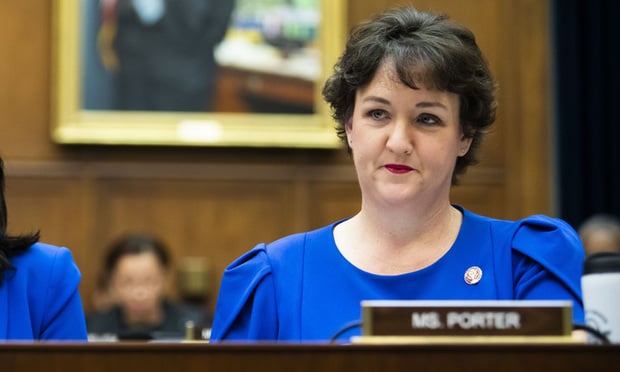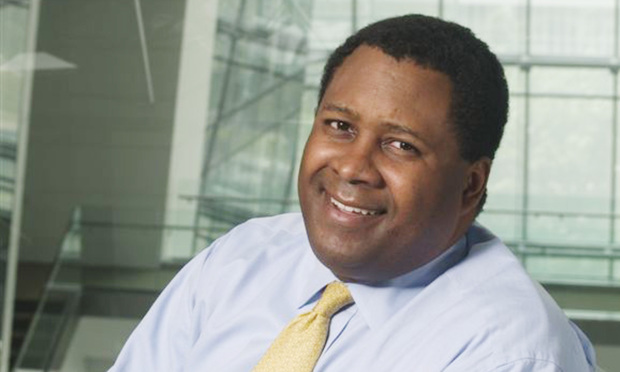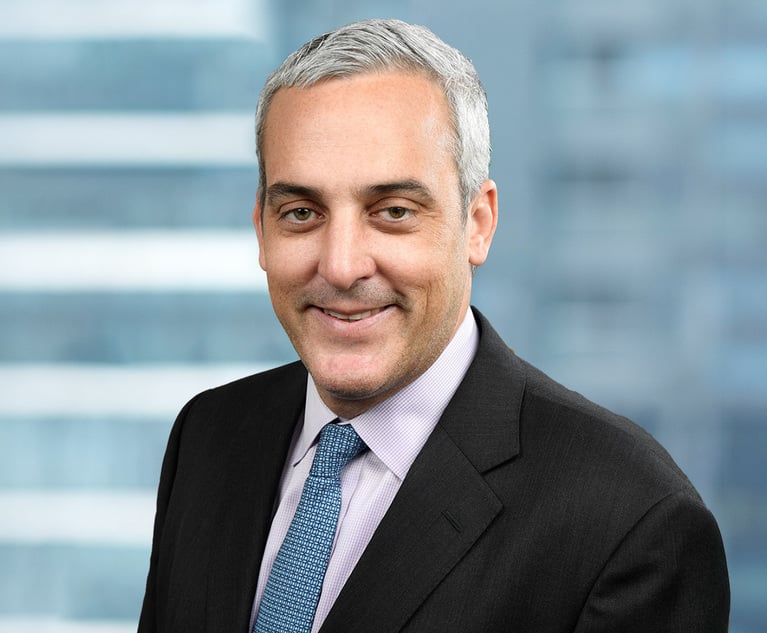'I Don't Want My Client to Be Blindsided': Executives and Their Lawyers Brace for Rep. Katie Porter's Questions
The California Democrat's distinctive questions are tripping up executives. White-collar and congressional lawyers have taken notice—and here's what they have to say about it.
March 18, 2019 at 02:55 PM
9 minute read
 Rep. Katie Porter, D-California (Photo: Diego M. Radzinschi / ALM)
Rep. Katie Porter, D-California (Photo: Diego M. Radzinschi / ALM)
When her turn came to question Wells Fargo CEO Tim Sloan last week, freshman Rep. Katie Porter, D-California, quickly made clear that she had done her homework.
She identified statements Sloan made in the months after Wells Fargo's fraudulent account scandal made headlines, in which he'd said the bank was committed to restoring customers' trust. Sloan's language, Porter said, struck her as “vague” and, perhaps, “obscure, empty promises” from an executive well-versed in corporate speak. “Do those statements mean something to you, Mr. Sloan?” Porter asked. Sloan responded: “They do.”
Porter soon revealed what she had been setting up. Reaching down behind the dais, she retrieved a poster featuring blown-up text from a court filing in which Wells Fargo's lawyers at Sullivan & Cromwell dismissed Sloan's statements as “paradigmatic examples of nonactionable corporate puffery, on which no reasonable investor could rely.”
Why were Wells Fargo's lawyers making that argument? Porter asked Sloan, the Wells Fargo chief executive since 2016. “I don't know why our lawyers are arguing that,” he replied.
The exchange went viral—and it wasn't the first time. Porter, serving on the House Financial Services Committee, grilled Equifax's CEO Mark Begor in February about why his company's lawyers were arguing that a 2017 data breach had not caused any harm to consumers. Begor said it was “hard to comment” on the activities of Equifax's lawyers.
Porter's distinctive style, drawing on her experience as a law school professor, has forced white-collar defense lawyers who specialize in congressional hearings to grapple with how to prepare clients for questioning that uses a company's own legal arguments against its top executive. Her repeated, effective use of that approach promises to make her a starring figure in preparations that have been known to include mock hearings, with lawyers playing the part of lawmaker during rehearsals.
“This tactic is a new and particularly effective example of what has long been the risk for a corporate executive, the face of a company, testifying in Congress,” said O'Melveny & Myers partner David Leviss, a former senior investigative counsel for the House Oversight and Government Reform Committee. “Regardless of the subject matter of the hearing and the facts at hand, members of Congress will make you the face of the company and make you defend whatever statements or actions they can attribute to the company—fairly or unfairly.”
Justin Shur, a partner at MoloLamken LLP, said Porter's novel approach has shown that lawyers need to dig deep into a company's litigation stance as they prepare an executive to appear before a congressional committee.
“I might not have necessarily pulled the docket and scrubbed all the filings to make sure I'm familiar with all of the substance of everything that's been filed. Because of this line of questioning, it's become prudent to incorporate that into your preparation,” Shur said. “There might be some nugget in some filing, in some footnote that a particular member is going to hone in on, and I don't want my client to be blindsided by it.”
Sloan's experience underscored how arguments made in court, by lawyers, can backfire in the court of public opinion.
Porter highlighted an argument Wells Fargo raised in San Francisco federal court against a securities class action alleging that the bank made misleading public statements and failed to disclose the full extent of consumer abuses that brought it continued regulatory scrutiny.
In describing past statements as “puffery,” Wells Fargo's defense team at Sullivan & Cromwell employed a term carrying a specific meaning in the context of securities class actions. The U.S. Court of Appeals for the Ninth Circuit has described puffery as “exaggerated advertising, blustering and boasting upon which no reasonable buyer would rely.”
 Timothy Sloan, CEO of Wells Fargo (Photo: Diego M. Radzinschi / ALM)
Timothy Sloan, CEO of Wells Fargo (Photo: Diego M. Radzinschi / ALM)Sloan appeared unprepared to give any explanation of that argument or the phrasing.
“Are you lying to a federal judge or are you lying to me and this Congress right now about whether we can rely on those statements?” Porter asked.
“Uh, neither,” Sloan said.
“It's convenient for your lawyers to deflect blame in court and say that your rebranding campaign can be ignored as hyperbolic marketing,” Porter said. “But when then you come to Congress, you want us to take you at your word. And I think that's the disconnect that's why the American public is having trouble trusting Wells Fargo.”
“I'm not leaving. I want to see what you've got in store for me today.”
Porter's questioning skills have vaulted her into national prominence. Already, she is drawing comparisons to her former Harvard Law School professor, Sen. Elizabeth Warren, D-Massachusetts, who like Porter burnished a reputation early on in her congressional career as a sharp questioner with a particular taste for grilling financial industry executives.
“I've been really gratified that some of my freshmen have said to me, 'Oh, you're up next. I'm not leaving. I want to see what you've got in store for me today,'” Porter said during a recent appearance on the MSNBC program “The Last Word with Lawrence O'Donnell.”
In interviews with The National Law Journal, several lawyers said that any effective preparation process includes an exhaustive search of past statements and a coordinated approach that involves a company's communications team, along with in-house and outside counsel involved in litigation.
“You have to anticipate everything—anything that a member of Congress or the staff preparing a member of Congress can find. That's all fair game. You have to be ready for it. You should be ready for it,” said Covington & Burling partner Brian Smith, who like other lawyers stressed he was speaking generally about the process and not about individual performances.
But even the most thorough preparation cannot turn over every stone.
And Porter's trademark line of questioning has presented another vexing challenge: drawing distinctions, when necessary, between congressional testimony and an argument raised in court.
“It's hard—you don't want to distance yourself from what's said in court and have the court get crosswise with your client,” said Arnold & Porter partner Amy Jeffress. “So you have to be very careful. But I do think you can draw a distinction.”
 Reginald Brown of Wilmer Cutler Pickering Hale and Dorr. (Courtesy photo)
Reginald Brown of Wilmer Cutler Pickering Hale and Dorr. (Courtesy photo)Reginald Brown, a partner at Wilmer Cutler Pickering Hale and Dorr, said the “reality is that standards may be very different in a court of law than in the court of public opinion.”
“Understanding that delta and explaining it can be challenging. But the differences are very real,” said Brown, who helped prepare Facebook executives Mark Zuckerberg and Sheryl Sandberg ahead of their congressional appearances last year.
So how should a lawyer prepare a client? For one, style counts. “The difficulty is you don't want your client to sound like they're lecturing the committee on the law or providing some technical, legal explanation. You want your client to be plain-spoken, not defensive or apologetic, but able to get their point across,” Shur said.
At the Equifax hearing, Porter opened her questioning by asking Begor for his Social Security number, date of birth and address “at this public hearing.” Borger declined to provide that information at the hearing, saying he'd be a “bit uncomfortable” doing so. He noted he'd been a victim of identity theft three times in the past decade.
“So my question then is, if you agree that exposing this kind of information, information like that that you have in your credit reports, creates harm, therefore you're unwilling to share it, why are your lawyers arguing in federal court that there was no injury and no harm created by your data breach?” she asked.
When Begor demurred, saying it would be “hard to comment” on the activities of Equifax's outside lawyers, Porter cut him off.
“Respectfully, excuse me, but you do employ those lawyers and they do operate at your direction. They're your counsel. And they are making these arguments in court, arguing on the record. I have the pleadings here from the court case. They're arguing on the record that this case should be dismissed because there is no injury and no harm created by the disclosure of people's personal credit information,” Porter said. “Yet I understand you, as I would, to believe that the exposure of that information—I asked you if you would give it to the committee and you understandably said no—would in fact create a harm. So I guess I would ask you to please look carefully at what you're lawyers are doing.”
As Porter spoke, she held up a thick stack of papers, a pink tab attached to one of the pages.
Read more:
How Many Women Lawyers Were Elected in the Midterms? Quite a Few
DOJ's Brian Benczkowski Pledges 'Fair Shake' for Cooperating Companies
How a 'Never Trump' Covington Partner Won, Then Lost, Lucrative ZTE Monitorship
DOJ's New Compliance Monitor Guidance Accounts for 'Burdens' on Companies
This content has been archived. It is available through our partners, LexisNexis® and Bloomberg Law.
To view this content, please continue to their sites.
Not a Lexis Subscriber?
Subscribe Now
Not a Bloomberg Law Subscriber?
Subscribe Now
NOT FOR REPRINT
© 2025 ALM Global, LLC, All Rights Reserved. Request academic re-use from www.copyright.com. All other uses, submit a request to [email protected]. For more information visit Asset & Logo Licensing.
You Might Like
View All
GOP Now Holds FTC Gavel, but Dems Signal They'll Be a Rowdy Minority
6 minute read
Fired by Trump, EEOC's First Blind GC Lands at Nonprofit Targeting Abuses of Power
3 minute read
Latham Adds Former Treasury Department Lawyer for Cross-Border Deal Guidance
2 minute read
'Erroneous Rulings'?: Wilmer Asks 4th Circuit to Overturn Mosby's Criminal Convictions
3 minute readTrending Stories
- 1Big Law Firms Sheppard Mullin, Morgan Lewis and Baker Botts Add Partners in Houston
- 2Lack of Jurisdiction Dooms Child Sex Abuse Claim Against Archdiocese of Philadelphia, says NJ Supreme Court
- 3DC Lawsuits Seek to Prevent Mass Firings and Public Naming of FBI Agents
- 4Growth of California Firms Exceeded Expectations, Survey of Managing Partners Says
- 5Blank Rome Adds Life Sciences Trio From Reed Smith
Who Got The Work
J. Brugh Lower of Gibbons has entered an appearance for industrial equipment supplier Devco Corporation in a pending trademark infringement lawsuit. The suit, accusing the defendant of selling knock-off Graco products, was filed Dec. 18 in New Jersey District Court by Rivkin Radler on behalf of Graco Inc. and Graco Minnesota. The case, assigned to U.S. District Judge Zahid N. Quraishi, is 3:24-cv-11294, Graco Inc. et al v. Devco Corporation.
Who Got The Work
Rebecca Maller-Stein and Kent A. Yalowitz of Arnold & Porter Kaye Scholer have entered their appearances for Hanaco Venture Capital and its executives, Lior Prosor and David Frankel, in a pending securities lawsuit. The action, filed on Dec. 24 in New York Southern District Court by Zell, Aron & Co. on behalf of Goldeneye Advisors, accuses the defendants of negligently and fraudulently managing the plaintiff's $1 million investment. The case, assigned to U.S. District Judge Vernon S. Broderick, is 1:24-cv-09918, Goldeneye Advisors, LLC v. Hanaco Venture Capital, Ltd. et al.
Who Got The Work
Attorneys from A&O Shearman has stepped in as defense counsel for Toronto-Dominion Bank and other defendants in a pending securities class action. The suit, filed Dec. 11 in New York Southern District Court by Bleichmar Fonti & Auld, accuses the defendants of concealing the bank's 'pervasive' deficiencies in regards to its compliance with the Bank Secrecy Act and the quality of its anti-money laundering controls. The case, assigned to U.S. District Judge Arun Subramanian, is 1:24-cv-09445, Gonzalez v. The Toronto-Dominion Bank et al.
Who Got The Work
Crown Castle International, a Pennsylvania company providing shared communications infrastructure, has turned to Luke D. Wolf of Gordon Rees Scully Mansukhani to fend off a pending breach-of-contract lawsuit. The court action, filed Nov. 25 in Michigan Eastern District Court by Hooper Hathaway PC on behalf of The Town Residences LLC, accuses Crown Castle of failing to transfer approximately $30,000 in utility payments from T-Mobile in breach of a roof-top lease and assignment agreement. The case, assigned to U.S. District Judge Susan K. Declercq, is 2:24-cv-13131, The Town Residences LLC v. T-Mobile US, Inc. et al.
Who Got The Work
Wilfred P. Coronato and Daniel M. Schwartz of McCarter & English have stepped in as defense counsel to Electrolux Home Products Inc. in a pending product liability lawsuit. The court action, filed Nov. 26 in New York Eastern District Court by Poulos Lopiccolo PC and Nagel Rice LLP on behalf of David Stern, alleges that the defendant's refrigerators’ drawers and shelving repeatedly break and fall apart within months after purchase. The case, assigned to U.S. District Judge Joan M. Azrack, is 2:24-cv-08204, Stern v. Electrolux Home Products, Inc.
Featured Firms
Law Offices of Gary Martin Hays & Associates, P.C.
(470) 294-1674
Law Offices of Mark E. Salomone
(857) 444-6468
Smith & Hassler
(713) 739-1250








